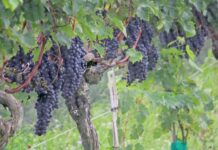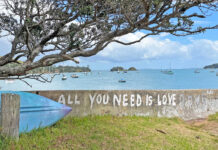I’ve had a lot of big shocks in my personal life this last tumultuous month, which is pretty much normal for most of us these days, and I thought I had rubbed pretty well through most of them.
Then I opened my rates bills and found I was seriously mistaking my capacity for rolling with the punches.
I live on a block with the entire hillside of regenerating coastal mānuka forest that provides what’s left of the rural landscape protection zone to the west of Oneroa’s village (and overlooking the contentious Te Huruhi Recreation Reserve).
The city had been noticeably coy about the fiscal effects of this year’s new valuations and issued fulsome assurances that cohorts of professionals had performed this great feat of paper warfare. All too familiar; such assurances never bode well for pint-sized Waiheke which shares with Devonport the penalty of paying the highest perhousehold rates in this wretched, money-centric supercity culture.
In 2012, at the start of this second Act-party supercity, my rates were $1400, high at that time. By 2022 they were $5700 and rose another $1000 in 2023.
Now, my rates are within a fish-and-chip dinner of $10,000.
Justified by a lunatic land value (zoned for very little development) and a council playing ducks and drakes with my access.
So do I mind paying $200 a week as a rates tax on land that has been the family home for nearly 50 years and that contributes to the best amenities of Waiheke?
No, I actually wouldn’t mind if it meant we had continued the work of Gordon Hodson back in the early 1990s and built on the spare council land at Ostend for housing for the elderly. Or urgently needed repurposing of homes for the young. Or if we had experienced strong advocacy for more resources to secure the future for coming generations.
Not if land in Mātiatia’s traffic midden had been turned into an elegant and workable transport hub and was not languishing as a plum to be plucked when the right developer opportunity presents itself to sycophantic officialdom.
Not if we had the community swimming pool we raised a lot of money for, or toilets that didn’t look like 1950s concrete (or merely garden sheds). Or affordable halls and the panoply of festivals that have died for lack of money for ever more risk-averse red tape.
Or if horsemanship was valued as a life skill for girls. The current board’s series of delays since 2017 leave them still facing eviction from the pony club on Te Huruhi Recreation Reserve that they have maintained as a rather fabulous adjunct to island life since their founding club members first cleared it of gorse and blackberry 50 years ago.
I do object when the local board closed out support and funding for initiatives like Mike Lee’s traditional no-take marine reserve at Hākaimangō Point that would have expressed the island’s amply demonstrated commitment to the genuine health of the poor Hauraki Gulf.
I do object to the local board’s apparently unlimited budget for backroom planning and consultation for Waiheke’s next 30 years that now occupies reems of fatuous future planning that has been consulted only with hand-picked ‘stakeholders’ with deep pockets and behind the closed doors.
So to be fair, I really do object to my $10,000 rates bill, not least when we all know that the city squeezes upwards of an annual $32 million of rates a year out of us (and another 20 percent in fees and charges) when we could have pretty much everything we need on half of that sum, instead of breadcrumbs and virtual confiscations to plug the city’s serial fiscal holes.
That’s literally hundreds of thousands of dollars of our island’s economy going to waste while we have such specific and compelling needs, in large part because of a longstanding lack of advocacy for the good of the whole demographic network of the community.
If we want any or all of these outcomes from the local government elections on Waiheke and to leave a legacy of a working, generous and inclusive community to our young, a significant proportion of us need to use the next two months to assess who can be trusted to pull the levers in a spirit of generosity and for everyone’s benefit, including the environment and future generations.
Elections are a time to sift specific and measurable deeds from the sonorous verbiage.
Tides are turning. Working to find solutions to all of these different strands cannot be left to a tiny handful of elected representatives plodding through sanctimonious agendas in an empty room in an empty building where the once lively concept of public forum has fallen to a dismal low.
We get more done when we collaborate and persuade and negotiate and measure and deal with stuff. We have the brains and the talent and experience and what’s not to like about genuinely preparing to fulfil all of our potential for everyone. Would be fun.
FYI and just saying: Last time I looked, Ōpōtiki District Council, population 9000, was running a fairly generous ship on $12 million in rates.
• Liz Waters
© Waiheke Gulf News Ltd 2025






